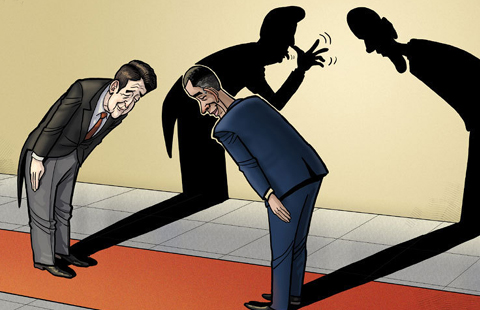Rouble concern not yet over
By Cheng Yijun (China Daily) Updated: 2014-12-27 08:51First, the recovering US economy has strengthened the dollar, which would have a depreciatory effect on other currencies, especially those of major economies such as Russia.
The continuing fall in oil price (from nearly $107 a barrel in June to about $56 a barrel on Dec 23) has worsened the Russian government's problems because it depends heavily on oil exports for its revenue.
Second, the flight of international capital from Russia that began last year after the West imposed economic sanctions on Moscow for its alleged involvement in the Ukraine crisis has dealt another blow to the country's economy, because the resultant dearth of foreign currencies forced the country to undersell a large amount of roubles.
Earlier this month, US lawmakers further complicated matters for Russia by passing the Ukraine Freedom Support Act aimed at providing military and non-military aid to Ukraine and impose fresh sanctions on Moscow. International speculative capital swooping out to make profits from the depreciating rouble too have played a role in the fall of the Russian currency.
Of course, Russia's sluggish economy should be primarily blamed for the recent troubles, which in turn, have diminished Russians' confidence in the rouble and the benefits of trade with foreign countries.
Because of the sizable depreciation of the rouble and rising inflation, Russia's "de-dollarization" countermeasure to deal with the Western sanctions and reduce its dependence on the US dollar too could be in jeopardy.
The spillover effect of the rouble's slide has already been felt by China's Geely Automobile Holdings, whose shares fell 17 percent to HK$2.59 in Hong Kong on Dec 17, because of its sluggish sales in Russia, its major overseas market. Besides, tourism between the two countries is expected to suffer, for many Russians can no longer afford holidays in China.
It will take some time for the rouble to become stable given the latent recession in Russia. But it is still too early to say Russia urgently needs China's financial assistance to tide over its currency crisis.
Being a country with the third-highest foreign exchange reserves and with abundant administrative measures at hand, Russia today is more adept at handling the rouble's depreciation than it was during the 1998 financial crisis.
The author is a researcher at the Institute of Russian, East European and Central Asian Studies, affiliated to the Chinese Academy of Social Sciences.











